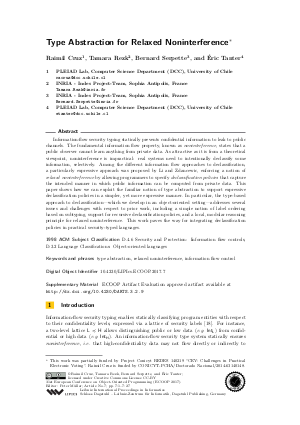Type Abstraction for Relaxed Noninterference
Authors Raimil Cruz, Tamara Rezk, Bernard Serpette, Éric Tanter
-
Part of:
Volume:
31st European Conference on Object-Oriented Programming (ECOOP 2017)
Part of: Series: Leibniz International Proceedings in Informatics (LIPIcs)
Part of: Conference: European Conference on Object-Oriented Programming (ECOOP) - License:
 Creative Commons Attribution 3.0 Unported license
Creative Commons Attribution 3.0 Unported license
- Publication Date: 2017-06-16
File

PDF
LIPIcs.ECOOP.2017.7.pdf
- Filesize: 0.65 MB
- 27 pages
Document Identifiers
Subject Classification
Keywords
- type abstraction
- relaxed noninterference
- information flow control
Metrics
- Access Statistics
-
Total Accesses (updated on a weekly basis)
0PDF Downloads0Metadata Views
Abstract
Information-flow security typing statically prevents confidential information to leak to public channels. The fundamental information flow property, known as noninterference, states that a public observer cannot learn anything from private data. As attractive as it is from a theoretical viewpoint, noninterference is impractical: real systems need to intentionally declassify some information, selectively. Among the different information flow approaches to declassification, a particularly expressive approach was proposed by Li and Zdancewic, enforcing a notion of relaxed noninterference by allowing programmers to specify declassification policies that capture the intended manner in which public information can be computed from private data. This paper shows how we can exploit the familiar notion of type abstraction to support expressive declassification policies in a simpler, yet more expressive manner. In particular, the type-based approach to declassification---which we develop in an object-oriented setting---addresses several issues and challenges with respect to prior work, including a simple notion of label ordering based on subtyping, support for recursive declassification policies, and a local, modular reasoning principle for relaxed noninterference. This work paves the way for integrating declassification policies in practical security-typed languages.
Cite As Get BibTex
Raimil Cruz, Tamara Rezk, Bernard Serpette, and Éric Tanter. Type Abstraction for Relaxed Noninterference. In 31st European Conference on Object-Oriented Programming (ECOOP 2017). Leibniz International Proceedings in Informatics (LIPIcs), Volume 74, pp. 7:1-7:27, Schloss Dagstuhl – Leibniz-Zentrum für Informatik (2017)
https://doi.org/10.4230/LIPIcs.ECOOP.2017.7
BibTex
@InProceedings{cruz_et_al:LIPIcs.ECOOP.2017.7,
author = {Cruz, Raimil and Rezk, Tamara and Serpette, Bernard and Tanter, \'{E}ric},
title = {{Type Abstraction for Relaxed Noninterference}},
booktitle = {31st European Conference on Object-Oriented Programming (ECOOP 2017)},
pages = {7:1--7:27},
series = {Leibniz International Proceedings in Informatics (LIPIcs)},
ISBN = {978-3-95977-035-4},
ISSN = {1868-8969},
year = {2017},
volume = {74},
editor = {M\"{u}ller, Peter},
publisher = {Schloss Dagstuhl -- Leibniz-Zentrum f{\"u}r Informatik},
address = {Dagstuhl, Germany},
URL = {https://drops.dagstuhl.de/entities/document/10.4230/LIPIcs.ECOOP.2017.7},
URN = {urn:nbn:de:0030-drops-72688},
doi = {10.4230/LIPIcs.ECOOP.2017.7},
annote = {Keywords: type abstraction, relaxed noninterference, information flow control}
}
Author Details
Supplementary Materials
- ECOOP 2017 Artifact Evaluation approved artifact available at https://doi.org/10.4230/DARTS.3.2.9
